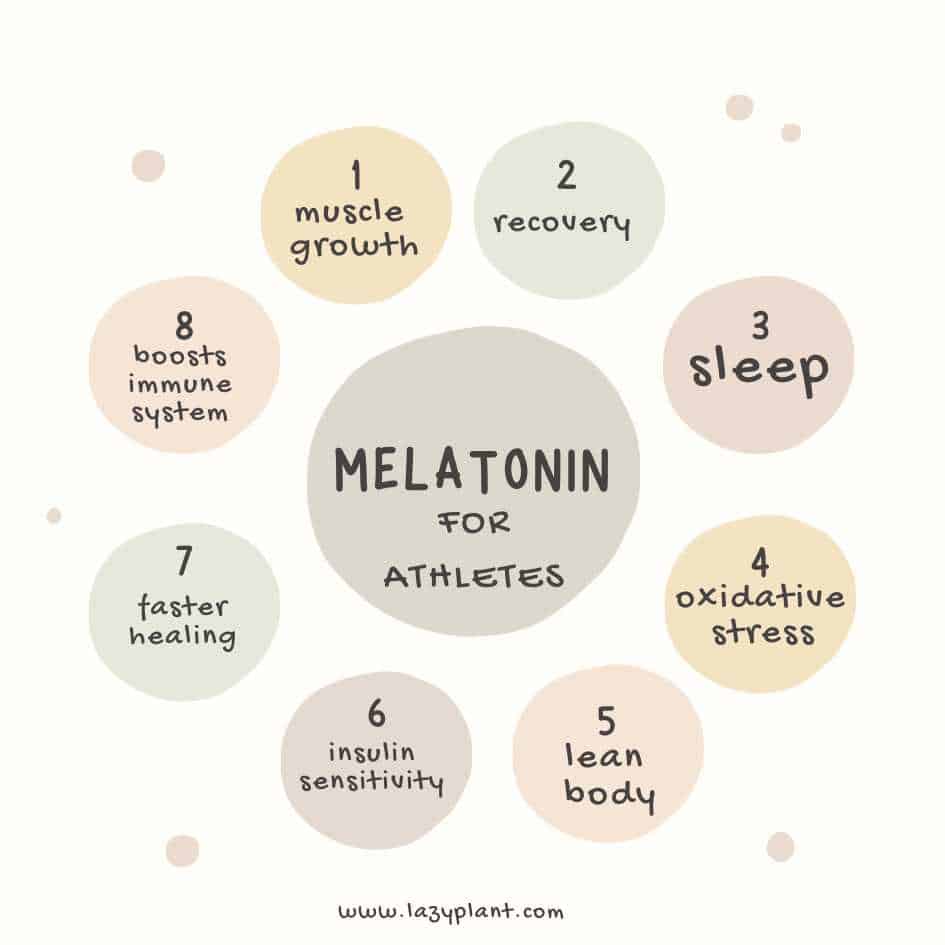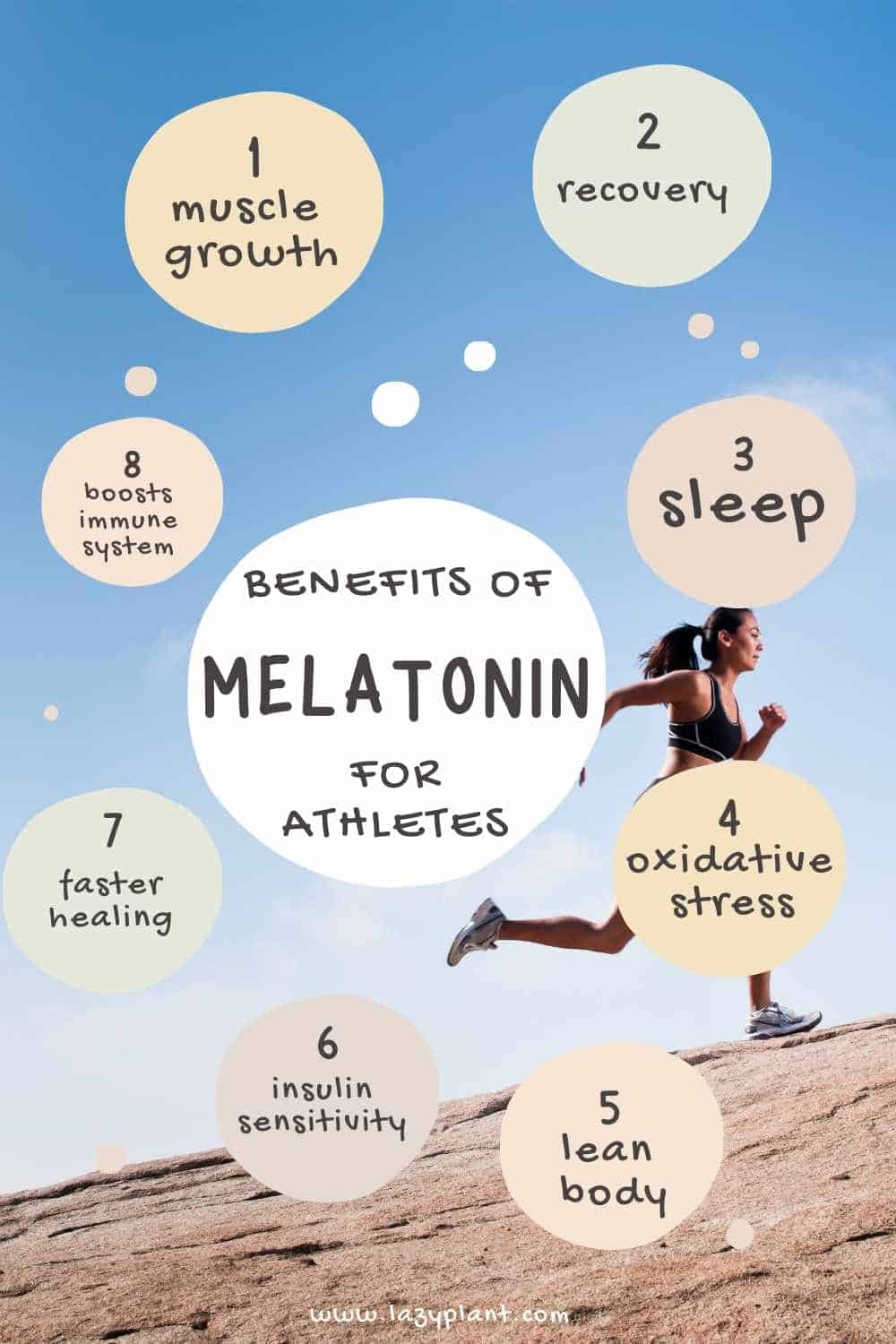High melatonin intake is key for athletes. It affects muscle growth and athletic performance. It speeds up recovery, improves glycogen use during strenuous exercise, delays fatigue, supports a good night’s sleep, builds a lean body, and above all protects from oxidative stress!
Newbies, amateur, high-trained, and even elite athletes can take advantage of high dosages of melatonin.
The role of melatonin in Recovery
High-intensity or long-lasting physical exercise can be dangerous for health. It causes biochemical and hormonal disturbance. It increases oxidative stress and inflammation.
Hence, amateur athletes should gradually increase exercise difficulty. The muscles adapt and tolerate better high concentrations of reactive oxygen species by enhancing activity of antioxidant enzymes.
Moreover, amateur and elite athletes should consume foods high in antioxidants to fight exercise-induced oxidative stress. On the contrary, poor diet enhances muscle stress after exhaustive exercise.
Melatonin has powerful antioxidant and anti-inflammatory properties. In fact, melatonin has beneficial effects on tissue repair and recovering from intense exercise.[1]

Athletes with high melatonin concentrations have less severe muscle inflammation, and oxidative stress scores resulting from exhaustive exercise.
Actually, melatonin can enhance exercise tolerance! It increases muscle glycogen 3 hours after exhaustive exercise, providing a better cellular metabolic environment for future efforts. Fast muscle glycogen replenishment after strenuous exercise is key for muscle recovery and improved athletic performance.[2]
Intense exercise disturb antioxidant status of athletes. However, high melatonin intake strengthens antioxidant status in trained athletes in various sports.[3]
Melatonin is a key antioxidant compound that may neutralize negative affects of exhaustive high-intense physical exercise, improving athletic performance.
Melatonin speeds up recovery in many ways. Among others. it lowers the proinflammatory cytokines, lipid peroxides, C-reactive protein, and reactive oxygen species, which can be strongly elevated in athletes who work out to exhaustion.
Hence, more and more endurance athletes take high doses of melatonin from supplements to enhance physical performance! Even high-trained athletes can take advantage of high dosages of melatonin.
Improves athletic performance
Additionally, melatonin has beneficial effects on athletes because it plays a key role in glucose homeostasis and lipid metabolism regulation. It promotes a healthy metabolic rate!
According to studies, melatonin:
- regulates glycogen breakdown to glucose
- preserves glycogen stores
- improves insulin resistance in the muscle and liver
These properties of melatonin influence physical performance during high intensity exercise. As melatonin increases the muscular glycogen content, it provides a greater tolerance to physical exercise.[4]
Melatonin for Muscle growth
More workouts per week have been associated with muscle growth. Especially when athletes of bodybuilding or other athletes who work out for muscle hypertrophy train a muscle group 2–3 times per week.[5]
Muscle strength depends on optimum glucose and insulin levels in the blood. Melatonin is involved in this process. It also improves insulin sensitivity!
Furthermore, melatonin may stimulate growth factor synthesis.
Keep in mind that melatonin secretion is limited during aerobic exercise. On the other hand, it’s enhanced during high-intensity interval exercise!
Promotes healing after Injury
Moreover, melatonin has beneficial effects on injured muscles or muscle pain.
Taking high doses of melatonin from food or supplements is beneficial for increasing muscle strength. It also helps adapt to demanding exercise!
Melatonin helps speed up muscle healing after injury. A balance between muscle injury and regeneration is critical for athletes.[6]
Melatonin for a lean body
Furthermore, eating foods high in melatonin is beneficial for athletes of bodybuilding because it seems to improve body composition. It reduces fat mass while supporting the growth of muscle mass.[7]
Melatonin might help athletes achieve a lean body, as it enhances fat burning by increasing thermogenesis. Melatonin promotes the synthesis of brown adipose tissue, which burns fat cells for energy or maintaining a normal body temperature.
Thus, melatonin plays a key role in regulating metabolism and body weight.
In fact, a diet high in melatonin supports weight loss.
Helps Sleep better at night
Additionally, melatonin helps athletes sleep better at night. It has beneficial effects on sleep onset latency, duration, and quality.
A rejuvenating good night’s sleep is key for every athlete. The body rebuilds itself at night.
Endurance athletes often experience poorer quality of sleep, due to high training load. Physical exercise can influence secretion of melatonin.

Intense resistance training may also decrease the ability of an athlete to naturally synthesize adequate levels of melatonin.
The human body synthesizes melatonin mainly at night. It’s estimated that the body has only 5 pg/mL of melatonin during the day, while it has 50–100 pg/mL at night.
The melatonin synthesis starts increasing between 9:00 and 10:00 p.m. It peaks between 3.00 and 4.00 a.m. The exact hour depends on the circadian rhythm of each person.
Synthesis and secretion of melatonin is stimulated in darkness. Light exposure at night, poor diet, alcohol, disease, and certain drugs may have detrimental effects on melatonin levels, though.
Even strenuous exercise can be bad for the synthesis and secretion of melatonin!
What’s the best time to work out?
Actually, according to studies, intense physical exercise can both reduce and increase melatonin concentrations. Time of exercise, exercise type (aerobic, anaerobic), difficulty, and training level may play a role in melatonin concentrations.
Exercising in the late evening, when the body starts producing high doses of melatonin, seems to delay or even inhibit the secretion of melatonin.
On the other hand, exercise of high intensity performed in early evening might enhance melatonin release.
Thus, as a rule of thumb, it’s suggested to work out during the daytime. Exercising in the morning until afternoon doesn’t have negative effects on melatonin levels. In fact, it might raise melatonin levels by 20% compared to late-afternoon exercise.
Do athletes need melatonin supplements to sleep at night?
Melatonin is commonly used as a natural supplement among athletes to regulate sleep cycles or as a treatment of sleep problems like insomnia.
Consuming foods high in melatonin before bed is also beneficial.
Moreover, elite athletes who travel frequently could benefit from taking melatonin supplements if they have sleeping problems. Melatonin seems to eliminate symptoms of jet lag.
Additionally, taking melatonin a couple of days before a big race may calm down an athlete. It ameliorates anxiety.
Boosts the Immune System
Moreover, melatonin boosts the immune system. It plays an important role in managing viral infections. According to studies, melatonin may protect against many viruses like influenza![8]
Thus, melatonin may protect athletes from the flu or at least alleviate symptoms or speed up recovery. This way, athletes can perform more strenuous workouts during the season.
Eat foods high in melatonin after exercise
We can naturally skyrocket our melatonin intake by consuming certain foods. There aren’t too many foods with melatonin, though. Only certain nuts and fruits are great dietary sources.
The best time to consume them is at your pre-workout or post-workout meal. Also, you could eat foods with melatonin at dinner.
For instance, strawberries are among of the best post-workout foods you can eat. They’re packed with melatonin as well as many other phytochemicals that promote muscle growth and recovery!
Also, tart cherry juice has decent amounts of melatonin. But, it’s more than melatonin. It’s one of the richest beverages in powerful health-promoting phytochemicals. Athletes could improve physical performance by drinking a cup of tart cherry juice before intense exercise!
Additionally, you could drink a banana smoothie or pineapple juice after exercise. These two foods can naturally increase melatonin concentrations in the body by 330%. Bromelain in pineapple juice can also relieve joint pain.
Last, but not least, athletes should drink a cup of cranberry juice around exercise. Cranberries are the richest common food in melatonin! It’s packed with many other phytochemicals and vitamins as well.
How much melatonin should athletes take a day?
There hasn’t been established a recommended daily intake of melatonin. Certainly, you can consume a wide variety of foods containing melatonin.
Even high dosages from supplements are considered pretty safe. Supplements don’t exceed the maximum safe dose.
According to a 2017 study, 24 athletes who treated with 100 mg of melatonin per day before bedtime had beneficial effects on athletic performance without experiencing any side effects.[9]
In most cases, daily melatonin dosages of 1-10 mg are more than enough.
Healthy people can boost their melatonin intake from diet, though.
Always consult your healthcare provider before taking any supplement.
What’s the best time to take melatonin?
A great time to take melatonin supplements is before bedtime. It could speed up muscle recovery and help you sleep.
Moreover, you could take melatonin before strenuous exercise. Among other benefits, melatonin before exercise could preserve muscle glycogen stores, delay fatigue, and muscle pain.
However, athletes should start taking small dosages. High doses of melatonin before a workout may cause adverse effects, such as daytime drowsiness.
Should athletes take high doses of melatonin from supplements?
Actually, most athletes should get melatonin from food.
High dosages of any antioxidant compound, such as vitamin C, vitamin E, or coenzyme Q may be bad for athletic performance. They may have detrimental effects on sport training adaptation.
